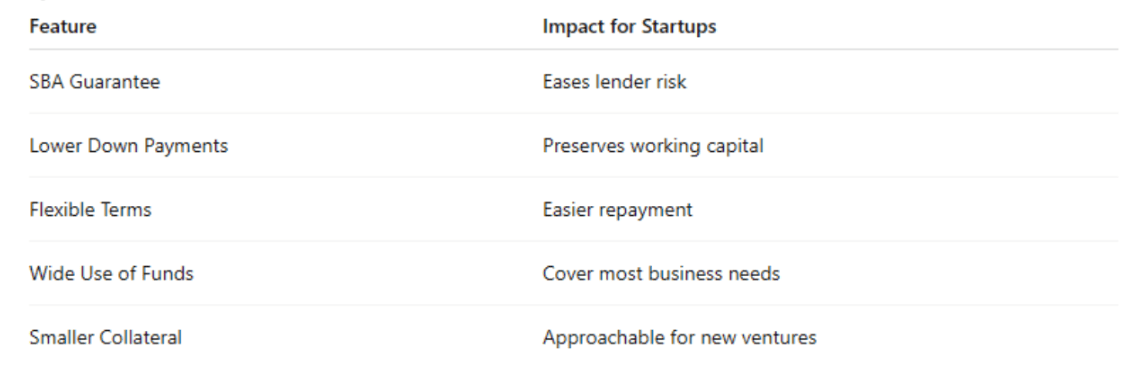Securing funding as a startup is tough. Banks see young companies as high-risk since most don’t have much collateral, long track records, or perfect credit scores. For first-time entrepreneurs and early-stage owners, these hurdles can feel like massive roadblocks to launching or growing a business. If you’re searching for smart funding solutions, SBA loans for startups might be your best ally. The SBA (Small Business Administration) backs loans that help level the playing field for new businesses, making big dreams possible even for those with slim resources.
Ready to kickstart your business journey? Schedule a Consultation with Cornerstone Capital Advisors so you can focus on what you do best: building your business.

Why Startups Struggle to Access Traditional Business Loans
For startups, securing funding that fits your growth plans can feel nearly impossible. Understanding these common barriers helps you explore more innovative financing options that provide the capital you need without slowing down your momentum.
Barriers to Traditional Financing for New Businesses
Most banks are cautious when lending to startups. Here’s why new ventures often hit a wall:
- Limited or zero operating history makes it hard for lenders to assess business viability.
- Collateral requirements exceed what many new owners can offer.
- Lower credit scores from founders with short credit histories or past challenges.
- Hefty down payments shrink cash reserves needed for actual operations.
Traditional business loans often come with stiff terms. It’s like being asked to run a race with weights on your ankles when you’re just starting.
The Impact on First-Time Entrepreneurs and Early-Stage Founders
It’s not just about the numbers. Many first-time business owners invest their savings, risking personal finances. If banks say “no,” it can stall everything: hiring, buying equipment, or even opening doors. Early-stage founders often get stuck in a loop: they need money to grow, but can’t qualify for funding because they haven’t grown yet.
SBA Loans for Startups Make Launching and Expanding Easier
SBA loans tackle the exact obstacles that leave many founders stranded. With government guarantees and flexible terms, these loans give you a fighting chance without asking for the world up front.
Key Features at a Glance:

Curious how your startup measures up? Check SBA Loan Eligibility and see if you’re a fit.
Easier Qualification for Early-Stage Businesses
The biggest difference with SBA loans for startups is the government guarantee. The SBA promises to repay a large portion of the loan if a business defaults, lowering the risk for lenders. This structure lets banks say “yes” to startups they might otherwise decline.
Visit the U.S. Small Business Administration’s loans page to see the range of programs available and how the guarantee system works.
Lower Down Payments: Preserving Working Capital
Traditional lenders might ask for 20-30% down payments. SBA loans, like the 7(a) program, often require much less down, sometimes as low as 10%. Keeping more cash in your business helps with hiring, buying inventory, and staying agile during your first months.
Flexible Use of Funds: Operations, Equipment, Marketing, and More
Startups need money for all sorts of things, not just one-off purchases. SBA loans allow wide uses, including:
- Equipment or inventory
- Payroll and hiring
- Working capital
- Marketing and growth campaigns
- Leasehold improvements
This “funds for almost anything” flexibility can be the bridge between a startup idea and a thriving company.
Popular SBA Loan Options for Startups
Several types of SBA loans can fit new businesses:
- SBA 7(a) Loan: The most versatile, used for working capital, buying equipment, or real estate. Explore SBA 7a Loans for details on flexibility and eligibility.
- SBA Microloans: Great for very new businesses or those needing smaller amounts (up to $50,000).
- SBA Working Capital Loans: Short-term funding to cover payroll, inventory, or operations. Find more in the SBA Working Capital Loans Guide.
Take your next step with confidence by consulting Cornerstone Capital Advisors to review which loan option best matches your needs.

How to Qualify and Apply for SBA Loans for Startups
The process is straightforward if you know the steps. Planning and preparing your documents will save you time and headaches.
Eligibility Criteria and Required Documentation
Startups can qualify if you meet these standard requirements:
- Operate as a for-profit in the U.S.
- Founder’s credit score (typically 640+)
- Completed business plan and financial projections
- Down payment or owner equity
- Collateral (varies, but SBA is flexible)
Key paperwork often includes:
- Personal and business tax returns
- Bank statements
- Detailed business plan
- Copies of licenses or leases
- Ownership and management documentation
The SBA application submission guide lists official forms you’ll need.

Pro Tips for Maximizing Approval Odds
- Double-check your business plan for clarity and detail.
- Prepare realistic financial projections and expense breakdowns.
- Address gaps in your application with honest explanations.
- Apply to several approved SBA lenders, not just one bank.
- Seek expert guidance from a certified SBA advisor or lending partner.
The NerdWallet SBA loan checklist covers prep work and what lenders look for.
Want to boost your chances? Talk with Cornerstone Capital Advisors early in the process for guidance tailored to your startup’s specifics.
What to Expect: Timelines, Support, and Ongoing Steps
Here’s a clear overview of the typical timeline and process you can expect when applying for this type of loan. Understanding these stages helps you plan and stay prepared throughout each step, from gathering documents to receiving funds.
- Prep and application stage: 1–4 weeks (faster if you organize docs in advance)
- Lender review and approval: 2–6 weeks, depending on loan type and lender speed
- SBA review (if needed): Adds several days to a week
- Funding: Once they approve your loan, lenders typically disburse the money within a few days.
Throughout, SBA lenders act as partners, not just gatekeepers, to help you work through details and clarify questions. Many timeline slowdowns are avoidable with good prep and clear paperwork.
Turn Your Startup Vision into Reality with SBA Loans and Expert Guidance
SBA loans for startups make big ideas possible for founders who don’t have years of business history or loads of collateral. With easier qualification, lower down payments, and flexible use of funds, these loans give you a realistic shot at launching and scaling your business, right from the start.
The best time to start is today. If you’re ready to explore SBA funding, clarify the process, and boost your odds of approval, schedule a consultation with Cornerstone Capital Advisors and get expert guidance for your next steps.
